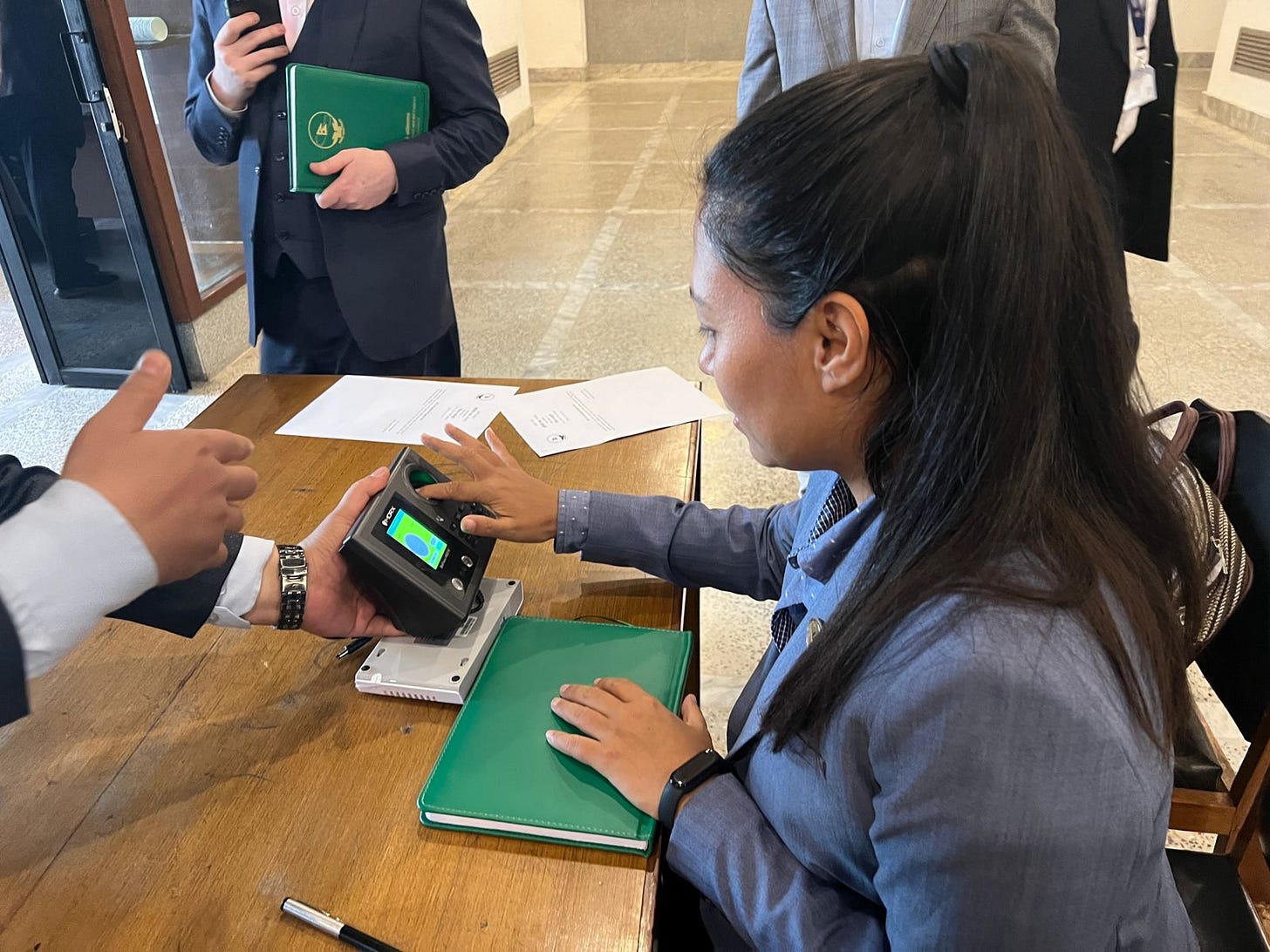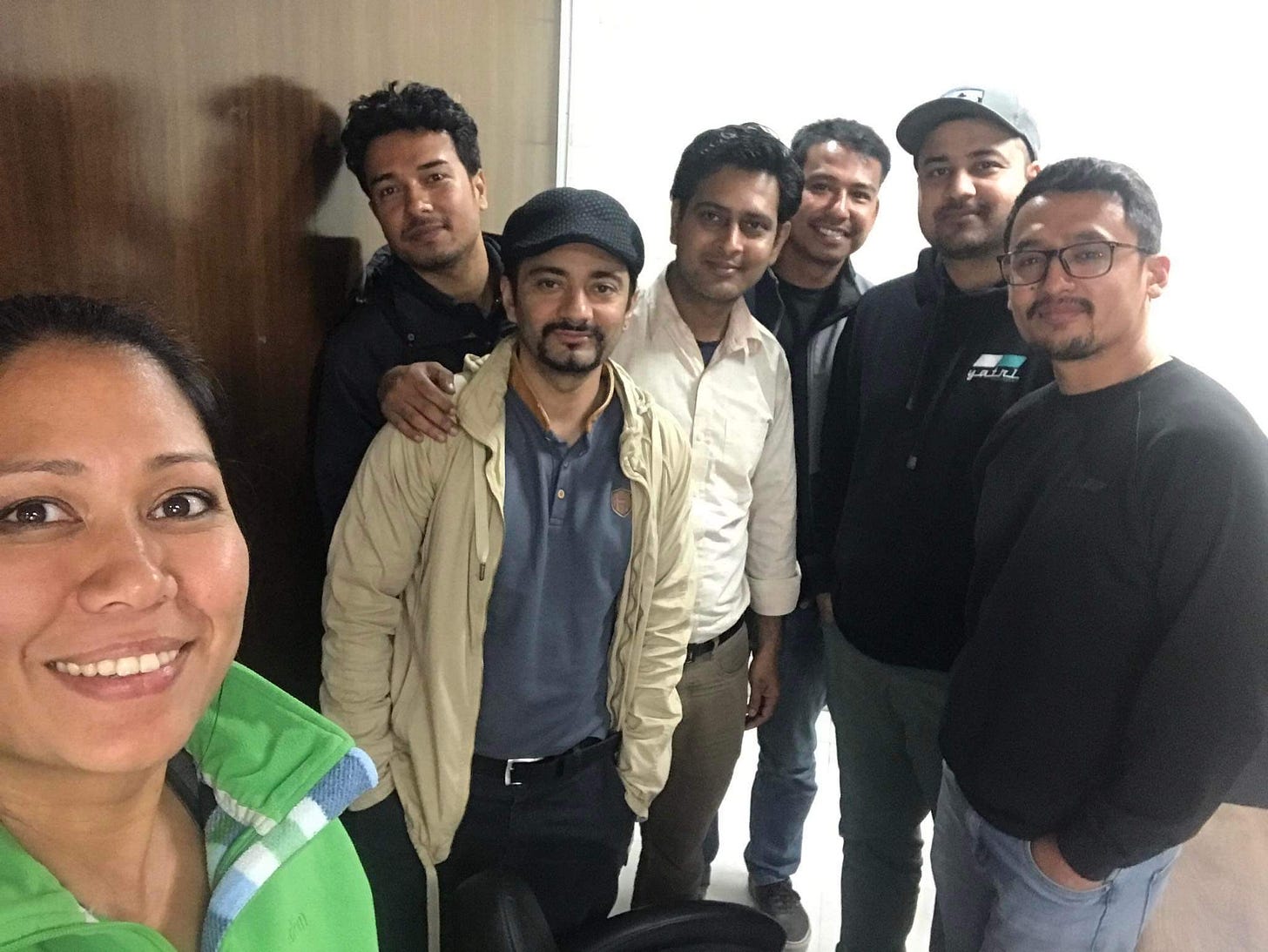Newsletter 4: Small wins, slow progress
Monthly progress tracker of the tasks done by Member of Parliament Sumana Shrestha and her secretariat.
Namaskar dear readers,
I am Sumana Shrestha, a member of the House of Representatives in the Federal Parliament of Nepal 2022. In this newsletter, I update you on exactly what my secretariat and I have been up to for the past two months. This edition of the newsletter covers Baishak and Jeth 2080 and we have a lot to share from these hectic months!
As the scorching heat of summer began to set in, we worked tirelessly. We submitted letters and parliamentary resolution motions to various ministries regarding a host of issues including the registration of domestically produced vehicles, proposed amendments to the proposed policies and programs as well as other corruption-related bills— all informed by your feedback.
Below you will find more information on the work we have done in these two months. I will not deny that at times, we have been disappointed by the apathy and response of the government to our interventions. However, we remain relentless in fighting these battles.
(I) New Undertakings:
Celebrated New Year’s by envisioning Nepal as a Tech Hub
This article is written to share our vision of Nepal as a progressive and profitable tech hub, led by young and capable homegrown Nepalis
Future steps:
Legislation: An Information Technology Act that creates an enabling environment to foster innovation and technology
Skills training for students to promote future employment in the tech sector: boot camps, internships, workshops, boosting CV, pipeline to accessing jobs
Submitted amendments to 4 bills via Facebook group: Bill Hackathon
Issue: Public participation in submitting amendments to bills tabled in the House of Representatives.Tasks accomplished: Collected amendment proposals from the public on three bills via the Facebook group.
1. The Abuse of Authority Investigation Commission (Third Amendment) Bill, 2076
Submitted a 27-point amendment to the bill to hold government officials accountable through meaningful and measured investigation of cases of abuse of authority
More details: Theoretical Discussion
2. The Prevention of Corruption (First Amendment) Act 2076
Submitted a 4-point amendment to the bill to increase accountability, coordination, and transparency across bodies to challenge existing definitions of corruption and prevent corruption on a macro and micro-level
For more details: Theoretical Discussion on corruption and this Bill | Full Explanation of Amendments
3. Business Operations Regulations of the Joint Committee of the Federal Parliament 2080
Submitted 16-point amendments to the bill to increase transparency, work efficiency, reduce political influence in hiring processes and ensure gender equity through a new committee
For more details: Why is it essential to de-politicize ‘constitutional hearing committee
Progress / Outcome: Amendments to the bill were rejected.
4. Budget session: Policies and Programs 2080/81
Submitted a 20-point amendment to the proposed policies and programs 2080/81, particularly regarding the systematic failures in budget theory, lack of coordination between the three levels of government, and lack of metrics to evaluate success in the budget. Called for a more meaningful prioritization of the funding in light of the economic situation in the country: Gave a speech on the same in Parliament
More details: Theoretical discussion on plans and policies for budget allocation
Progress/Outcome: Amendments to the policies and programmes were not approved.
Submitted two parliamentary motions for resolutions
1. Bhutanese Refugee Scam
Filed a parliamentary motion for resolution to provide the necessary instructions to find the government and the House guilty in the fake Bhutanese refugee case on four counts: treason, organized crime, fraud and forgery.
2. Local Infrastructure Development Fund
From fiscal year 2076-2078, around 17 billion rupees have been misappropriated from the fund. The revival of this fund is a means to continue the process of institutionalized corruption while the economy stagnates, leaving citizens vulnerable.
Steps taken: Put out a call to action to the public to call MPs and oppose the fund; Submitted a parliamentary motion for resolution opposing the revival of the Fund
Education, Health and ICT Committee
Commenced the Education, Health and Information Technology Committee with its first meeting; presented suggestions on sustainable development in these areas, set a year-long agenda and action plan, collating all official documents that have been submitted to Ministries thus far.
(II) Small wins
1. Conducted a ‘Law-Making 101’ Workshop
Conducted a virtual workshop to help people understand the lawmaking process, and how bills are made and presented—conducted in collaboration with Youth in Federal Discourse.
2. Campaigning for RSP Candidates
Spent a lot of time on the ground, mobilizing resources and campaigning for RSP candidates in the parliament and provincial elections
3. Publication of Report Card
Published my performance report card as evaluated by RSP
4. House of Representatives (HoR) Biometric Attendance System
The Federal Parliament Secretariat has installed a biometric attendance system for the House of Representatives.
Next steps: To make the real-time attendance statistics of MPs available to the public
5. Made in Nepal Vehicle Registration Problems
Issue: Nepal’s Motor Vehicles and Transport Management Act 2049, does not have provisions to register vehicles made in Nepal. Despite continuous promises of prioritizing domestic production, a lack of updated regulations has led to friction between authorities and owners, forcing manufacturers to stop production. Actions taken:
Submitted letters to the Ministry of Transportation and Yatri Motorcycles regarding ‘Made in Nepal’ registration problems. Joint meeting with Yatri
Progress / Outcome:
On 28 April, the Department of Transport Management amended the Transport Management Procedures Guideline 2060, adding a special provision for the registration of vehicles manufactured in Nepal. However, in the long run, the relevant Acts have to be amended.
(III) Issues raised in the Parliament:
Why was Parliament suddenly cancelled yesterday? We have heard that million rupees will be spent once the House sits. We are even unable to coordinate meetings between the House and various ministries, how will there be coordination on any such big project?
Should we bring a resolution regarding the question that the appointment of 52 members of the constitutional body is unconstitutional?
On July 6, 2049, Honorable Shailaja Acharya from this House asked the government not to buy chemical fertilizers from G2G saying that G2G (government-to-government procurement) would cost the government more money. But we are still using G2G. Why is this?
Evaluation of the performance of the Ministry of Home Affairs regarding loan sharks?
Hotline for suicide prevention
Fire and Disaster Risk Reduction Management
Institutionalization of foreign policy and suggested ways of doing so
(IV) Continued Efforts:
Submitted Written Questions to the Ministries via Parliament
Since we did not get satisfactory answers from the ministries through our direct letters, we have sent official written statements and asked these questions to the ministries on all of the issues mentioned below via the Federal Parliament Secretariat.
1. Land Encroachment of Bal Mandir
Issue: According to media reports, a total of 57 ropanis of land under the ownership of Bal Mandir and Lalit Kala Pratisthan has been encroached on by large corporations.
Developments: The Children’s Organization has cancelled the agreement between Ankush, Rita Singh and Manoj Mishra, to grab 29 ropanis of Bal Mandir land.
Progress/Outcome: We received a backdated document on Baishak 8 with the date Baishak 3 but did not receive any answers to the letter asking for details on (a) who is and has been involved in such discussions, (b) past discussions and (c) future discussions. The letter was directed to the Ministry of Women, Children, and Social Welfare.
2. Data on government-owned vehicles
Agenda: Accessing comprehensive data and information on government-owned vehicles
Progress / Outcome: Haven’t heard back from the Ministry of Home Affairs. FCGO has suggested asking respective ministries for the data.
3. VVIP Protocols
Issue: Following up on the government’s commitment to changing VVIP protocols.
4. Medical treatment of deprived citizens
Issue: Understanding the effectiveness of Bipanna Nagarik Sahayata Karyakram
Facebook | Instagram | Twitter | Website
(V) Getting involved with Sumana Shrestha Secretariat
1. Internship and Fellowship Opportunities
We recently recruited summer interns and research fellows, who are directly involved in all of our work— policy research, amendments and letters, social media management, and administrative support.
2. Call for Membership to RSP’s Education, Science & Technology Committees
Sent out a call for membership for experts in the above fields. To apply, visit this link.
We hope this email gives you a clear idea of our work in the last two months. On your part, we request you to reach out to your MPs and ask them what work they have been doing, what progress they have made, and what actions they are taking to represent you best. Participatory democracy requires your participation!
As ever, if I can be of assistance, please do not hesitate to make contact. Feel free to schedule a 30-minute call on Tuesdays or Wednesdays, or to write to me.
Thank you.
With regards,
Sumana Shrestha
Member of Parliament



